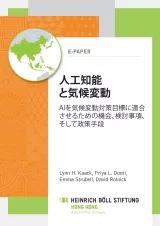Artificial Intelligence and Climate Change 人工知能と気候変動
With the increasing deployment of artificial intelligence (AI) technologies across society, it is important to understand in which ways AI may accelerate or impede climate progress, and how various stakeholders can guide those developments. On the one hand, AI can facilitate climate change mitigation and adaptation strategies within a variety of sectors, such as energy, manufacturing, agriculture, forestry, and disaster management. On the other hand, AI can also contribute to rising greenhouse gas emissions through applications that benefit high-emitting sectors or drive increases in consumer demand, as well as via energy use associated with AI itself. Here, we provide a brief overview of AI’s multi-faceted relationship with climate change, and recommend policy levers to align the use of AI with climate change mitigation and adaptation pathways.
This Japanese report is also available in English, Traditional Chinese and Korean.
Product details
Table of contents
Foreword 序文
Summary 概要
1. What is AI? AIとは何か
2. Artificial intelligence and climate change 人工知能と気候変動
- AI applications for climate change mitigation and adaptation 気候変動に対する緩和と適応に役立つAI利用方法
- AI applications increasing emissions or with uncertain impact GHG 排出量の増加や不確実な影響をもたらし得るAI利用方法
- Energy use of Al AIによるエネルギー使用量
3. Policy levers 政策手段
4. Policy-relevant considerations 政策に関連する検討事項
5. Conclusion 結論
Recommended readings 推奨文献
References 参考文献
